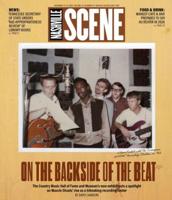Around 10 p.m. on April 14, 2011, two Metro police officers from the North Precinct's Crime Suppression Unit approached the front door of a brick home just off Buena Vista Pike. They wore raid vests, according to court documents: "black vests with patches and a [Metro Nashville Police Department] decal badge." Both were armed, although they never drew their weapons.
The officers would later say that after knocking on the door, they heard feet shuffling and saw some silhouettes going back and forth inside. The resident who answered the door, a then-39-year-old man, later testified that he had been asleep in a back room with his girlfriend when he heard banging on the door and people shouting, "Metro police!"
The officers told the man they were looking into a complaint they'd received about narcotics possibly being sold from the house. The man standing on his front stoop in a T-shirt and shorts probably didn't know that as many as six more officers were positioned at different spots around the home, creating a perimeter, nor that officers had already gone through his trash and stopped vehicles coming from the residence. Neither tactic turned up any controlled substances, evidence that drugs were being sold from the house or anything else that would have allowed police to obtain a search warrant. So they did what's known as a knock-and-talk.
Knock-and-talks are a legal police tactic that, in theory, involves just what the name suggests: sending an officer or two to knock on the front door of a home and, with the resident's permission, ask a few questions. But defense attorneys say police knock-and-talks in Nashville regularly go beyond the scope of what's envisioned by the court rulings allowing them and that they are used to get around the warrant requirements and protections granted by the U.S. and Tennessee constitutions. Critics also point to knock-and-talks as particularly prevalent in "over-policed" neighborhoods, another way that a small group of citizens can receive outsized attention from police and find themselves pulled into a criminal justice system in which they are outmatched.
In this case, the resident testified that after being repeatedly questioned by officers about why someone would make a drug complaint at his address, he told them his girlfriend would occasionally smoke marijuana on the porch. From there, things escalated: Police eventually entered the house, later testifying that they spotted marijuana seeds on a kitchen table. They detained the two residents, who also had a baby in the home, while they obtained a search warrant. The two were later charged with possession with intent to sell cocaine, marijuana and other controlled substances.
But Criminal Court Judge Cheryl Blackburn would later rule that all evidence seized from the home was inadmissible. The defendant and the involved officers gave different accounts as to whether officers were given permission to enter the house and the general tenor of the interaction. Blackburn ruled that the knock-and-talk was "problematic" given the late hour at which it was conducted and the number of officers involved.
"Additionally," Blackburn wrote, "as defense counsel pointed out, since the officers at the door were loudly announcing 'Metro police,' any occupant would have felt obligated to answer the door, thereby rendering the encounter nonconsensual."
The law allows for several types of interactions between police and citizens, among them arrests, justified by probable cause, and temporary detention, justified by reasonable suspicion that a person has engaged in criminal activity. A third type of interaction is what's known as a "consensual encounter." Knock-and-talks are supposed to fall under that umbrella. In those situations, the police have the same rights as anyone else you might encounter. The same way a Girl Scout or a Jehovah's Witness can walk up to your home and knock on your front door, so can police officers. And you can tell them you'd rather not talk. A fundamental question, though, is whether the badges and guns fundamentally change the interaction.
Metro Nashville Police Department spokesman Don Aaron tells the Scene that knock-and-talks are conducted throughout the city, typically in response to complaints or tips about possible criminal activity like drug sales.
"If the police department gets a complaint about a crime occurring involving drug sales, meth manufacture, that type of thing, an officer will go and just knock on the door," Aaron says. "The person is under no obligation to go answer the door. But an officer will knock on the door, if someone answers, have a conversation with the individual who answers, and as they're doing so kind of assess that individual's posture and look at what he or she might be able to see through the door. Sometimes there might be an odor of meth manufacturing, there might be an odor of marijuana, there might be cocaine visible on the table that the officer can see through the door."
Knock-and-talks can be done by uniformed patrol officers, but are usually done by Crime Suppression Units, precinct-based undercover officers who Aaron says are always wearing "clearly marked police gear" when they carry out such an interaction.
The Metro police department does not have a record of how many knock-and-talks it performs. But defense attorney Kevin McGee says, "It happens, probably, I would say almost every day. Definitely multiple times a week."
McGee has been in law practice since 2005. After three years in the Metro Public Defender's Office he moved to Knoxville, where he spent several more years as a public defender there. He has worked with his father, Rich McGee, since returning to Nashville in 2011, and their firm represented the residents in the aforementioned knock-and-talk case — one he says isn't that different from the many they see.
As if flipping through a Rolodex of case law in his mind, McGee rattles off various precedent-setting court rulings regarding knock-and-talks during a recent interview with the Scene. He cites the language used in seminal knock-and-talk cases at the state and federal level, including Tennessee v. Cothran. The language reads as follows:
"Absent express orders from the person in possession against any possible trespass, there's no rule of private or public conduct which makes it illegal per se or condemned invasion of a person's right to privacy for anyone openly and peaceably, at high noon, to walk up the steps and knock on the front door of any man's castle with the honest intent of asking questions of the occupant thereof, whether the questioner is a pollster, a salesman or an officer of the law."
But McGee says the practice often diverges from the theory, and he regularly sees knock-and-talk cases that, in his view, go beyond the scope of that language, particularly terms like "high noon," "peaceably" and "with honest intent." McGee says knock-and-talks are routinely carried out late at night, as opposed to the daylight hours when a door-to-door salesman might reasonably come to your house. And as opposed to the one or two officers calmly approaching a home, the way the theory of knock-and-talks suggest, he says what often happens in practice is that anywhere from six to 12 officers surround a home, watching back doors and side doors and peering through windows to see if anyone is moving.
Says McGee, "The question becomes, why would you need to be using that amount of surveillance and force if the honest intent is just to walk up and knock on the door and ask a few questions?"
Police department spokeswoman Kristin Mumford tells the Scene that more officers are used in cases where a fugitive is suspected to be in a home, but that decisions like that are made on a case-by-case basis at the precinct level. She reiterates that knock-and-talks largely follow citizen complaints about possible criminal activity. If a citizen believes a knock-and-talk has been done improperly, she says, that person can file a complaint.
And of course, the interaction is supposed to be consensual. The citizen can say no.
"The difference is most people don't feel comfortable telling a police officer to go pound sand," McGee says.
Many people don't feel comfortable or confident filing a complaint about what they see as police misconduct, either. During a recent interview for the Scene's cover story on policing in the Cayce Homes ("Police Project," April 28), Martesha Johnson, a Nashville native who has been an attorney in the public defender's office for more than seven years, describes conversations with clients about their interactions with police.
"We do encounter responses when we say, 'Well, why were you so open to allowing the police to search your vehicle?' " Johnson says. "You get the response, 'Well, they were gonna do it anyway.' Well, why didn't you follow up with a complaint regarding certain actions by the police department that you didn't believe were right? You get the responses, 'Why? No one's gonna believe me. No one's gonna believe the person with a criminal history over the police officer.' "
McGee points to a New Jersey Supreme Court case that led to a change in state law there, requiring reasonable suspicion before law enforcement could even request consent for a search during traffic stops. But Tennessee courts, he says, have declined to adopt such a standard. So knock-and-talks remain a tactic deployed in a gray area, a tactic endorsed by the law in theory but not necessarily reflective of it in practice, he says.
"They don't like [the term 'tactic']," McGee says. "But from my standpoint, that's exactly what it is. It's a way to get around the warrant requirement that's mandated by the Fourth Amendment and Article 1, Section 7 of the Tennessee Constitution that says you can't search a house without a warrant. So you've got a small exception that then becomes the norm."






